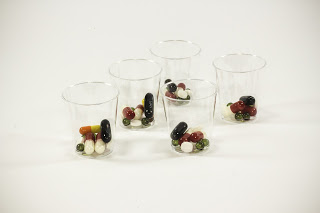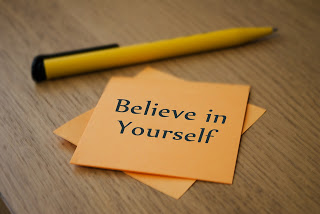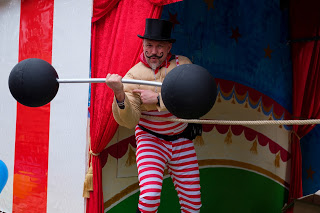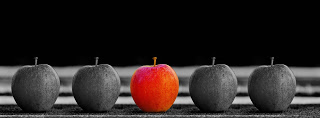
Instead of sitting in Elder’s Quorum and Sunday School this morning, I’m at home with a sick daughter. In an hour or so, my wife will trade me places and I’ll go attend Sacrament meeting with the other kids.
I got thinking about a discussion I had recently about the placebo effect. Some of you will know what it is. Basically, it’s something scientists have noticed when studying medicines and treatments, or when trying out new ones. To see if a medicine will work, the researchers will often give one group of people the actual medicine to try, and another group will get a non-medicine, a “placebo”. Something totally inert that we know won’t have any effect (at times, they’ll even use plain ol’ sugar, hence the name, a “sugar pill.”) Then we measure the difference between the two groups to see how well the medicine works.

Interestingly enough, taking something that isn’t supposed to work, often does have some benefit. The placebo often gives people an actual medical benefit even though it “shouldn’t.” For whatever reasons, placebos work, sometimes. Maybe it’s mental, maybe it’s emotional, maybe a mix of things. If the placebo gives a benefit 10% of the time, and the medicine gives a benefit 80% of the time, we can get a good idea whether we should use that medicine or not. Or, perhaps the placebo will give a 10% reduction in symptoms all the time, but the medicine will give a 70% reduction all the time. For some things, the placebo effect can be as effective as the best drugs we have for it! Crazy, right?
That means, that when we THINK something will work, often, it makes enough changes within our body and thus our life that it actually DOES work. The power of the mind—and the hormones and signals it can give off— is amazing. It’s so sensitive to actually believing in the medicine that to avoid it and make sure that the belief or doubt in a medicine isn’t causing the effect, researchers will usually not tell the patients which medication they are getting for the study. This is a single-blind test.
And to make sure that there are no hints about which medicine is real coming from the doctors, the researchers will often prevent the doctors from knowing which is which until after the study is over. This is called a “Double Blind” study and is the safest way we have in science of knowing whether something works or not: When NO ONE involved in the experiment knows which is the real medicine or not until after it’s over, then we know for sure there were no hints or nuances that might have tipped the doctor or the patient into believing a medicine will work or not.
That’s how powerful the placebo effect is. When we BELIEVE it works, many times, it actually does. Not always, and almost never the majority of the time, but enough that we can measure it consistently and have to watch out for it messing with our studies.

As a doctor who loves science and research, I have to consider this in my own life. For example, I am prone to tension headaches. Over the years, I’ve figured out many of the triggers for them, and I’ve learned many ways to get rid of them or halt them quickly using natural methods when I feel them starting. Sometimes, they still get the best of me and I’m having to reach for a few capsules of Ibuprofen for relief. Once I’ve taken some ibuprofen, depending on the food in my stomach and what kind of activity I’m doing, I can expect the muscles in my head and neck to relax and the headache to go away in about an hour.
Sometimes, though—maybe one in ten times—my headache will go away immediately. Within seconds or minutes of swallowing the capsule. I’ll get relief too fast for the effect to come from the actual medicine. On very rare occasions, the headache will start to ease off just by making up my mind to take it, before I’ve even taken it! My brain and my body KNOW what is coming and will trigger things inside of me to lessen the tension even without the ibuprofen! Yes, the placebo effect is powerful.
So, how does this affect my faith? I’ve listened to enough life coaches, attended enough motivational speeches and lectures, and read enough books to know that BELIEVING in something often MAKES it real. Countless books have been written on this idea already. Our belief in ourselves is critical to the direction our life goes.
Whatever I decide to believe in, I can find the evidence backing me up on that decision. This can go in both directions, for good or evil.

The funny thing about the decisions we make in life is that they are just about ALL made on our emotions first, then we use “logic” and “reasoning” to back it up or rationalize our decisions. It’s been studied enough times, that most scientists readily accept it as fact. We feel some emotional response to an experience which drives my decision-making process. Then I use my smarts and intelligence to prove to others I made the right call.
Knowing all this, how do I know when I’m really making a good decision, then? How do I know that I believe the Gospel for the RIGHT reasons, whatever those are? What even ARE the right reasons for believing in something? It’ll be different for each of you. Much of the time, it won’t matter. If it works for you, then it works for you, and that’s perfect.
For some of you, believing because your family believes will be enough. Believing because you see that it makes you a better person could be enough. Believing because you see that it has helped the lives of your community could be enough. Believing because you trust or trusted the person who taught it to you could be enough. Those are all wonderful reasons for believing the gospel. That is faith. We have seen the fruits of the gospel and hope to see those same truths lift us up as well. Like Alma described to the people of Ammonihah, we know the seed is good because it has sprouted.
Those have been good enough reasons for me in the past to even say “I KNOW”. Because I did Know. I had been taught by people I trusted. By people whose lives were made better. By family and friends and community. The church is both a school and a support group. We are taught through a curriculum from experts, and we share with each other what has worked for each of us in our individual lives. What we KNOW about the gospel, we have learned from people we love and trust.
None of us were baptized knowing how to deal with a difficult employee, or live with discouraging health problems, or with a perfect knowledge of how to deal with anxious and ill-tempered neighbors. Many people don’t even know how to be nice to themselves! The commandment “Love one another” doesn’t have many details regarding how to carry itself out. Church is one of many places where we can learn those important skills and apply them. We learn from rich and wealthy business people, we learn from mild and timid kids. We learn from hardened blue-collar workers. We learn from overwhelmed mothers. We learn from PhDs and apprentices alike. It is truly a place where lions and lambs dwell together. Where “babes” can play with “asps” and not be bitten.

We have been given a goal-post, a standard, a flag that we are trying to reach. It is known as “The Savior”. And as we learn the strategies of playing this game on this field, we apply those strategies to help us get to the end zone, to the goal. So that wherever we are in this field, however far apart our team is spread across its uneven terrain, we have the same endpoint.
How do I REALLY KNOW that my endpoint is the right one? How do I know I’m going in the right direction, playing for the right team, and working towards the right goal? How do we know we haven’t just deluded ourselves, or that our families are right? How do we stand up to accusations of “false hopes” and “self-righteous fantasies?” How do we know a miracle is real and not just selective memories or knowledge?
We keep learning. We learn to judge between truth and error. We advance ourselves in wisdom and intelligence. We seek for words of wisdom only out of “the best books.” Most importantly, we work to get a personal experience with God Himself.
We read that he has allowed others to see him or speak with him. We read of those who’ve had unmistakable experiences with Heaven. And then we work towards and pray for those kinds of experiences for ourselves. Or, we work and pray for enough faith and evidence to keep us believing until we do get the undeniable experience we are seeking.
After all that, if you’ve had an undeniable experience, don’t be surprised if the weathering and beating of life on Earth and a mortal body dulls that experience for you. Hold onto the memory as best as you can until it is renewed somehow. Just because a mountain is worn down by the wind and rain, doesn’t deny the forces that put it there in the first place nor of the majesty it once had.

What about all those others around the world, absolutely convinced as much as we are that their religion and faith are correct? I would say this, “If they are on a good path that will eventually lead back to the Savior in their own way, God would have no problem telling them so, right?” So, of course, they are going to continue doing the good things they are doing, and we should encourage that! If God tells us that what we are doing is right, then you should keep doing it! If you feel good at your other church, then that’s great! Keep going and learning. Keep improving, because you and the rest of us, all need improving.
If you subscribe to your faith and God tells you that He is There with you, believe it! Then do your best to live up to it. He will help you get back Home, wherever you started from. God won’t condone the evil things we do to each other, but he will encourage us in the good things we are doing.
If you find yourself wondering, “Is all this religion stuff, just a placebo? What if the Holy Ghost and the Spirit are just placebos What if it’s just my brain doing what brains have done through all of history? My head and my heart making me feel comfortable might just be all in my head?
Our higher reasoning, logic, memory, and morals all hang out in the outer layer of our brain, the neocortex. All of our biology, passions, emotions, drives, and instincts reside in our primitive inner-brain, the limbic system. These two layers account for most of what we talk about when it comes to our head and our heart (since our limbic system is what controls our heart and interprets its feelings). Most of our decision making happens in our limbic system, faster than we can recognize. Only humans (that we know of) have the ability to override our “biology” and “natural man” with our awesome neocortex.
A lot of the things we describe as the feelings of the Spirit and the Holy Ghost can be explained very nicely by neuroscientists. And to that, I say, “That’s so amazing!” What we’ve been taught by our religious leaders and prophets since before recorded history matches up with the latest science about the brain! Isn’t that incredible? Just because science can explain something doesn’t make it irreligious or unspecial. It should make it even more special!
Just because a medicine, works by the placebo effect to some degree (like how my headaches will ease up before the Ibuprofen has had time to work) doesn’t mean the medicine isn’t real and effective on its own as well. In fact, the placebo effect and the medical effect working together are an amazing combination.
Even the most scientific doctors will concede that no medicine will heal someone who doesn’t want to be healed. Our beliefs are equally as important as the actual medicine. Many times, the beliefs ARE the medicine, but the medicine is still crucial. I can’t usually set a broken bone just by believing I can, nor can I unclog a blocked artery, or remove a serious infection on belief alone. Actual medicine and surgery are very useful tools.
So is the Holy Ghost real and is faith an actual substance? Or are we just getting benefits because we think they are real?
The answer is: Both
“Couldn’t I get the same or better benefits by trying other things?” Perhaps you could, it may be your place in life to try it out and see. Maybe it’ll be your place in life to learn a few things the hard way. I hope you’ll come back and report to us how it went! I do have a spoiler for you: This is how we are all learning.
We are all having to learn by mistakes, by trying to do things our own way, or by consciously abandoning what we knew was right, to find out for ourselves. We are all doing this in different ways and to varying degrees. If you ever feel uncomfortable going to church because you don’t feel like you fit in, I’m here to tell you that most people don’t feel like they fit in. They are at church because they are trying to fit in.

If you don’t feel like what I just said applies to you, then perhaps the inability to see your own mistakes and the damage being caused by them is YOUR challenge. Or, one of them.
If faith in God were just a placebo medication, it would be the original medication that all other medications were made to imitate. It’d be foolish to abandon the faith of your parents without abandoning everything that their faith also taught them, and their parents, and their parents, and their parents’ parents about decency and civility and kindness and love; and most importantly about hope for the future. If you ever have a chance to live in an irreligious or more tribal culture, you will quickly learn the difference that Golden-Rule-based religion has had on our culture and society. The gap between the two types of cultures is enormous.
But, even though much of the goodness I gain from religion and faith might be explained by the placebo effect, God is no placebo.
I have known God better than I know my wife, or my parents or my children. I have heard Him speak inside of my “heart” and “mind” and show me things that no one else could show me. I have had a taste of the Reality outside of reality. A few times even. All while completely sober and clear-headed. This life is a hazy dream compared to it. The Next Life will be crystal clear compared to this life in the same way that a clean window compares to murky pond-water.
This gospel is true. The Book of Mormon is correct and true. God himself has told me it is. The Savior and His Atonement are real. You can be forgiven for your mistakes. God has told me this himself, as well.
I invite you to run after him and try to learn these things for yourself. Don’t be afraid to use something that is working for you and has worked for you. Just find ways to keep learning, growing, and adding to it.






